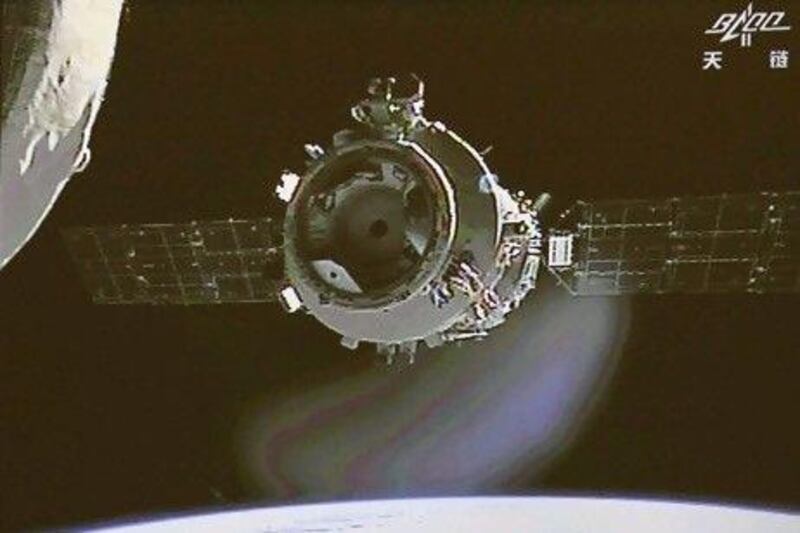A Chinese space laboratory that will vapourise when it re-enters the Earth’s atmosphere poses no risk to the UAE's residents or buildings, the country's space agency said on Sunday.
China's Tiangong-1 Space Laboratory is expected to re-enter the Earth’s atmosphere in early April, between 43 degrees north and south latitude, falling over a region that includes most Arab countries.
The Space Agency denied rumours that the falling debris would be dangerous because it contains chemicals and harmful materials.
In February, the UAE Space Agency said it was monitoring the laboratory with the International Astronomical Center. Their reports indicated that the debris will be rendered harmless as it breaks apart, as a result of atmospheric friction, before reaching the ground on its return.
"Although there is a minute chance of debris reaching the ground, it will be spread across the sea and there is virtually no chance that it will directly impact lives or buildings," the agency said in a statement.
_____________
Read more:
Space debris to fall over the Middle East next month
Special report: The UAE's journey into space
Dreams of Emirati teenager Alia Al Mansoori launched into space
_____________
The exact date and time when the debris is expected to fall will become more clear as April 1 approaches, the agency said, adding that it would publish regular updates on its website and social media channels.
The satellite was launched in September 2011 for use in a variety of experiments, but there was communication failure in 2016.
The laboratory includes two solar panels and weighs 8.5 tons. It is 10.5 meters long and 3.3 meters wide in diameter.
“Earth witnesses the fall of many objects, including satellites and other debris, on a daily basis. These objects do not pose a threat to the planet or its population due to their small size or the speed at which they are vapourised in the Earth’s atmosphere,” Mohammed Al Ahbabi, director general of the UAE Space Agency, said previously.
“Those that make it through are often scattered over vast areas in the form of very small stones.”
He said the country was well equipped and experienced in monitoring the co-ordinates of space objects, meteors and meteorites.
“Many of our capabilities stem from the UAE Meteor Monitoring and Filming Network launched two years ago to support scientific research. The network successfully provides reports and studies on meteor traffic over the UAE,” he said.
Three stations across the UAE are part of this network that was a joint venture launched by the UAE Space Agency and the IAC. The stations record astronomical phenomena with cameras that automatically start recording once a meteor is detected.







